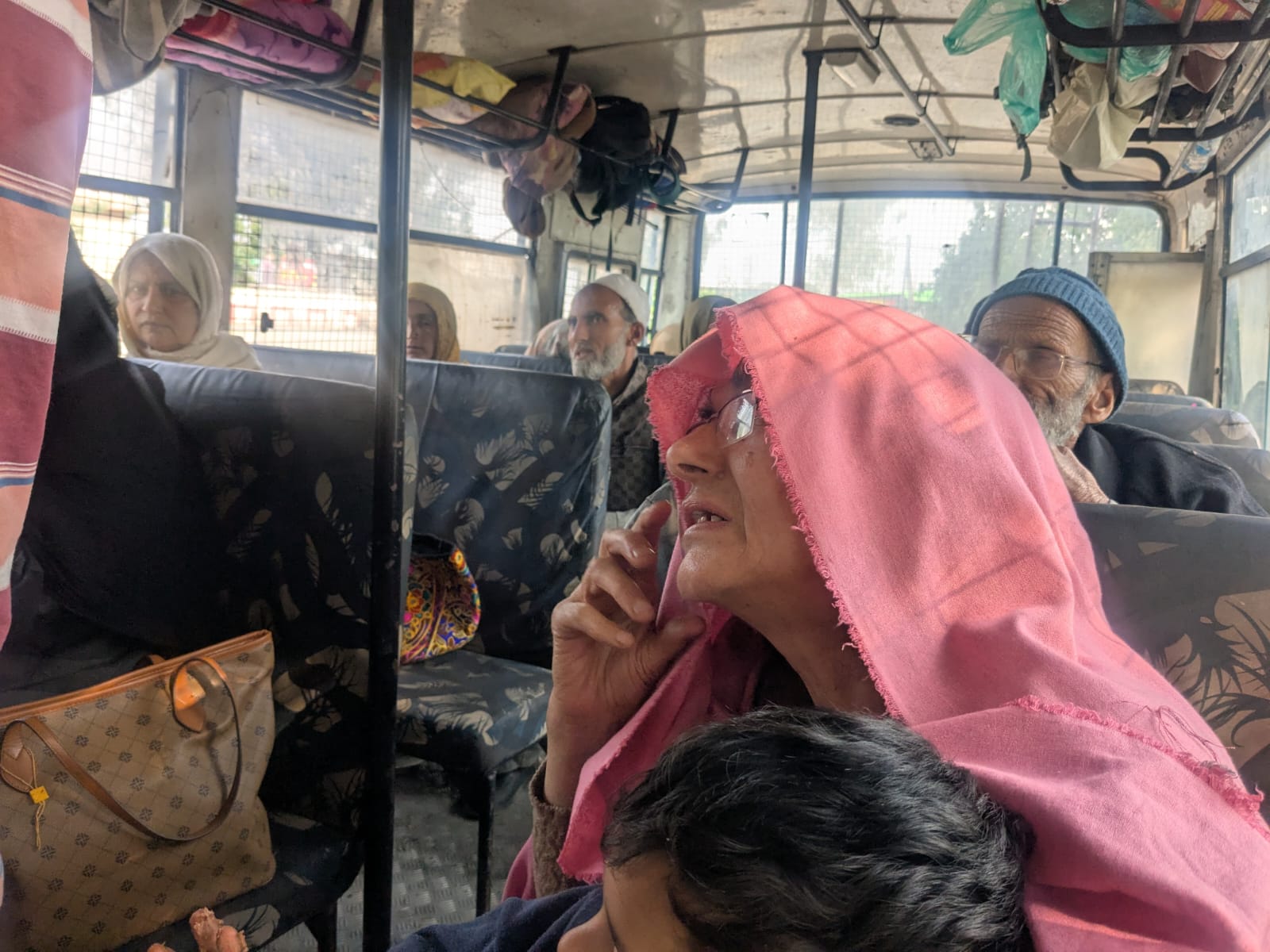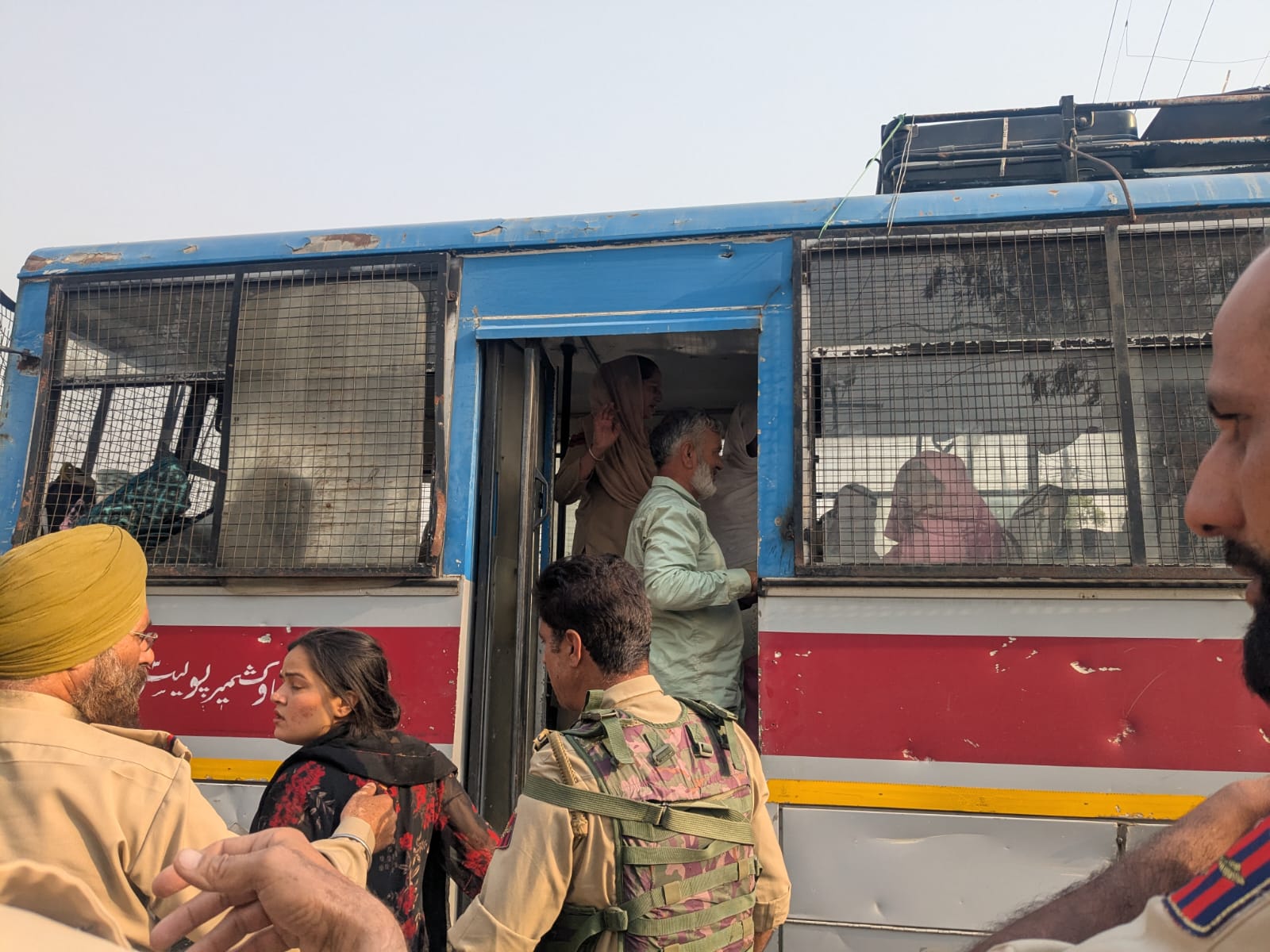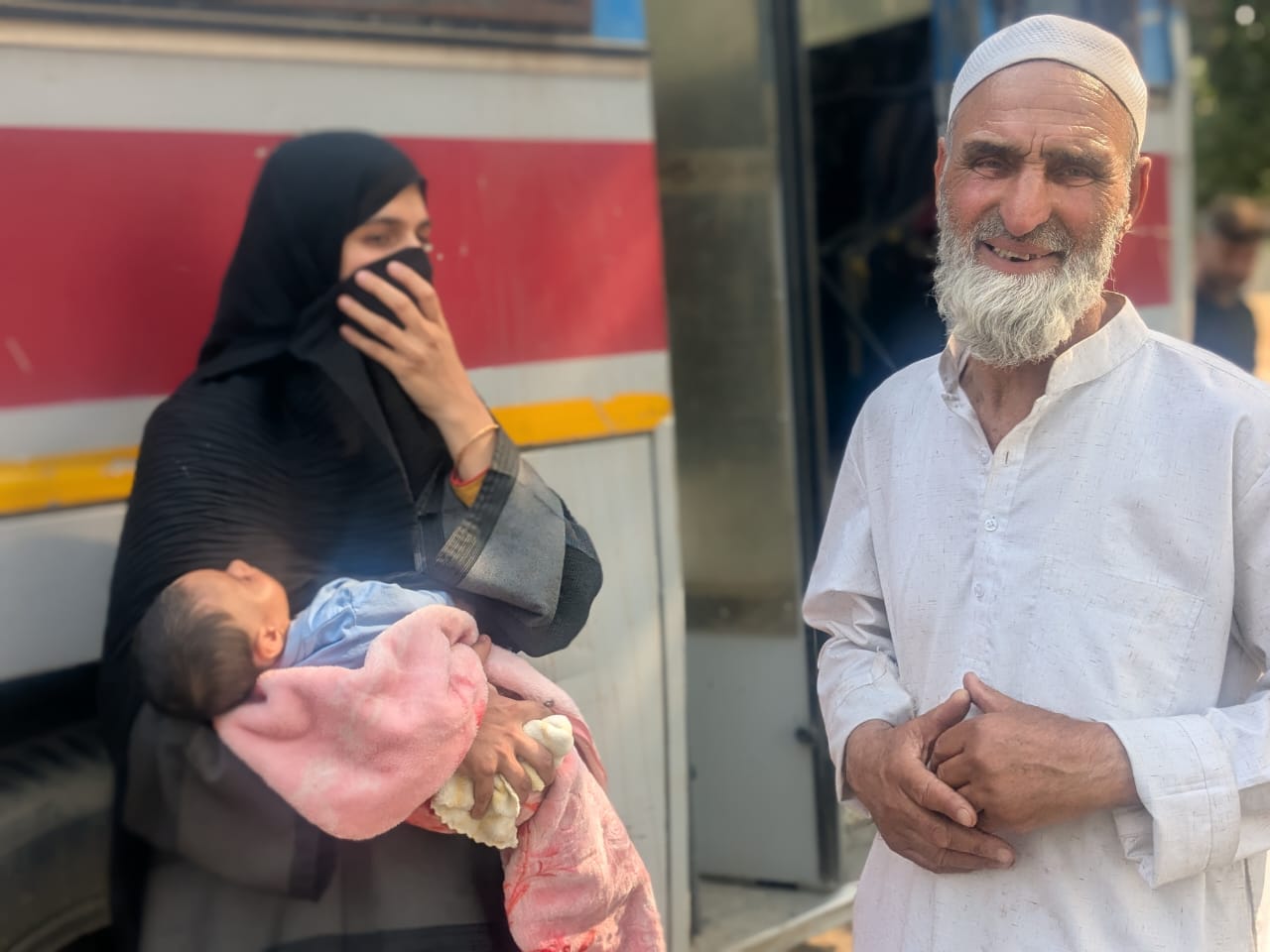ARTICLE AD BOX
Sara Khan cradles her two-week-old baby in the sweltering summer heat of northern India, switching between comforting him and wiping her own tears. Dressed in a salwar-kurta and plastic slippers, she has journeyed almost 360km overnight to reach the border after the Narendra Modi government abruptly revoked her visa and ordered her to leave.
“I am 33 years old and my son just 14 days,” Khan says, holding her newborn close before crossing the Attari-Wagah border post in Punjab. “We were not even given time to seek a court stay. I got the call at 3am. I have been travelling since.”
Khan is one of hundreds of Pakistani nationals directed to leave India this week after a terror attack in Pahalgam, a tourist town in the restive Himalayan territory of Kashmir, left 26 people dead, most of them Hindu visitors.
As bilateral ties plummeted New Delhi suspended all visas issued to Pakistani nationals, including long-term spousal permits.
Pakistani women staying on long-term spousal visas with their families in Jammu and Kashmir were rounded up by police in a sweeping midnight raid. On 30 April, the government allowed women married to Indian citizens to stay, but by then, many, like Khan, had already been brought to Attari.
“My long-term visa was valid till 2026,” Khan, who married an Indian citizen in Jammu and Kashmir’s Rajouri eight years ago, says. “But now they are saying it’s no longer valid since the Pahalgam attack.”
“All I ask is to be allowed to stay with my family. My older son is six years old and a Pakistani national. My baby was born by caesarean section. He doesn’t even have a name yet. He has no papers. How can I leave my breastfeeding child behind?”

The Pahalgam massacre – the worst attack on civilians in Kashmir in decades – has plunged the already frosty relationship between India and Pakistan into a fresh crisis.
India has blamed its rival neighbour for the attack, claiming two of the gunmen were Pakistanis. Islamabad has denied any involvement and called for an international investigation.
The attack was initially claimed but later denied by a little-known shadowy group variously called The Resistance Front or Kashmir Resistance, which India has accused of being a front for the Lashkar-e-Taiba, a proscribed militant group based in Pakistan.
While prime minister Modi vowed a “strong response” not only against the Pahalgam attackers but also their “backers”, widely understood to mean Pakistan, the foreign ministry revoked all visas issued to Pakistani nationals, telling them to move out by the end of April.
New Delhi also suspended a crucial river-sharing treaty from 1960 and expelled Pakistani diplomats and defence attachés.
Pakistan responded by closing its airspace to Indian carriers, cancelling all visas issued to Indians, expelling diplomatic staff, and suspending trade.

At Attari, Indian officials say, around 780 Pakistani nationals crossed over into their home country over six days. Some left voluntarily, others, like Khan, were escorted by police.
“I married here to build a life,” Khan says, pausing often to hold back tears. “I got the visa for my marriage. My husband and children are here. I do not want to go. Why would I leave? What happened in Pahalgam is terrible. I condemn it, with all my heart. The perpetrators must be punished. But we are innocent.”
Khan’s first son, born during a visit to Pakistan-administered Kashmir, holds a Pakistani passport. So he was going with her.
She claims the Indian embassy in Pakistan initially promised to give him a passport. “But when I returned to them, they went back on their word. So, I had to get him a Pakistani passport just to return home to my husband.”
The law allows foreigners married to Indian citizens to apply for citizenship only after residing in the country for 10 years. Any of their children born abroad can seek citizenship after at least seven years of residence.

In spite of having undergone major surgery just two weeks before, Khan felt she had no choice but to travel in the punishing heat.
“Tell me, would any doctor recommend such a journey right after a c-section?” she asks. “I didn’t even pack. I left in slippers. I bought nappies for my baby on the way.”
At the border, as she prepares to cross through the Integrated Check Post under police escort, Ms Khan breaks down. “My older son doesn’t know what is happening. He doesn’t know he is about to be separated from his father and baby brother.”
Her pleas trail in the dust and white heat of Attari as she disappears through the check post: “I don’t want to go. I will not go.”
The check post leads to the Indian emigration office, beyond which lies the demarcated border. Only people travelling to the neighbouring country are allowed beyond this post.
.jpeg)
A similar fate has befallen the family of Ghulam Masoor, 72, from Baramulla in north Kashmir. He was woken up around midnight on 28 April by police officers knocking on his door.
“They asked if my wife was from Muzaffarabad,” he recalls, referring to the capital of Pakistan-administered Kashmir.
“I said yes. Then they asked how long she had lived here. I told them she had been here for 40 years, since our marriage.”
But the officers were not there for conversation. They took Masoor, his wife and daughter-in-law to the local police station and kept them overnight.
His daughter-in-law, like his wife, is from Pakistan-administered Kashmir and has a valid visa.
The next morning at around 8am, the family were told that the two women were being deported. With no time to make arrangements, the family began a 24-hour journey to Attari, unsure of what lay ahead.
“My daughter-in-law has two children, one is a year-and-a-half old, the other just 40 days,” Masoor says.
“And she was asked to leave. In our country, there has been an act of terrorism. But the government is punishing its own countrymen.”
The women entered India years ago under a confidence-building measure launched by the Indian government, arriving on Nori, or No Obligation to Return to India, visas which granted them residency but not citizenship.
Though India always retained the right to revoke such visas, the sudden and sweeping mass expulsion has left the affected families stunned.
“My wife has gone to the other side and returned multiple times. Her visa is valid. My daughter-in-law’s too,” Masoor says.
“It is like lightning struck our entire family.”
He laments that his daughter-in-law is being forced to leave her husband and children behind. “There’s no law in the world that advises separating a husband from his wife.”
Who is being punished? Me or Pakistan or militants? Just me, right? An Indian citizen, no?
Ghulam Masoor, 72
The crackdown has caused anger and anguish among the affected families, with many appealing the Indian government for compassion.
Masoor makes a direct plea to the home minister, urging that accountability for the terrorist attack not come at the cost of innocent lives.
“My life is being snatched from me. I am over 70 years old. What will I do?” he asks. “If you think I have done something, just bury me and my family alive. But we are innocent. We have nothing to do with it.”

At the stroke of midnight on 29 April, Yasmeen Bibi was jolted awake by loud knocking at her door. In a flash, officers from the Kashmir police entered her home in Uri and escorted her away. Her local husband followed, carrying his sick toddler.
Bibi, they were informed, was being sent to Pakistan. They were given no time to pack. Bibi left with barely more than her papers, leaving behind four children who had no idea where their mother was going.
“I am from Jaffarabad in Pakistan. I was sleeping when, around 12am on 29 April, we were woken up by the Jammu and Kashmir police. I was brought to Uri police station. My daughter is crying since last night. And four other children are at home, with no knowledge on what is happening,” she says.
She pleads with the government to punish the guilty but spare her family. “Why are my children being punished? I have not managed to pack anything except for these documents. No clothes, nothing,” she says, her voice cracking with emotion.
Her husband, Aman Mushtaq Lodhi, 45, a daily wage worker, holds their toddler tightly and breaks down. “How will I take care of the children alone? We are daily wage labourers, working round the clock. Will I work or stay home to take care of them but with no income?” he asks, hands folded in a silent plea.
The couple married in 2006, during a period of relatively warm relations between India and Pakistan.
Lodhi had travelled to Pakistan with his mother, who had migrated to India during the 1947 Partition and was making her first visit back in 61 years.
There, she discovered that nearly her entire family had died, except for two brothers. A marriage was proposed between Lodhi and a daughter of one of the brothers and it was solemnised that same year.
Lodhi later sought to regularise his wife’s status in India. “In 2014, I tried getting her an Indian passport. But the situation was not good. So, the authorities told me to come back later. It never happened. But I was never harassed about my wife’s Pakistani nationality since she was on a valid visa.”
The family had lived quietly in Uri until the sudden crackdown.
“The turn of events since the Pahalgam attack has suddenly upended my family,” Lodhi says. “You tell me what have children done to deserve to be separated from their mother?”
As her baby stretches out her arms to reach her across the police barricade, Bibi can only offer reassurances through tears.
I am hopeful that the situation will change. But I want to tell the government they are punishing innocent children for the crimes of adults. Our country has no shortage of forces. So, if the terrorists attacked the people, how did they manage? Why have they not been caught yet? They are not being held, so innocent people like us are being punished.
Aman Mushtaq Lodhi, 45
There was reprieve for some people, however, after the government gave relaxation to women married to Indian citizens.
Mudassir Ameen Bhat’s wife was taken by police and brought to Amritsar for deportation but returned home to Srinagar, Kashmir, after the exemption was announced.
“I got married in 2017 and my wife has been living here on a long-term visa since then,” he says.
A police van took his wife through the Attari check post for deportation around noon on 30 April but returned her nearly five hours later in a surprise turn of events.
“She returned from the Indian emigration office around 5pm,” Mr Bhat confirms.
The Independent was unable to confirm if any other women had returned home from Attari in the wake of the exemption granted by the government.
The expulsion of Pakistani nationals underlines the deepening human cost of the Pahalgam attack and the escalating military and diplomatic tensions between India and Pakistan.
The Line of Control, the de facto border between the two nuclear-armed neighbours in Kashmir monitored by the UN, has witnessed six consecutive nights of shelling and exchange of gunfire.
Pakistan’s defence minister Khawaja Muhammad Asif told Reuters that they had reinforced their forces because a military incursion by India was “imminent now”.
India’s past responses to major attacks, such as the 2019 Pulwama bombing that killed 40 Indian paramilitary soldiers in Kashmir, have raised fears of escalation. Back then, India launched airstrikes on what it claimed were terrorist training camps inside Pakistan, though satellite imagery later showed no significant damage. Pakistan retaliated by downing an Indian jet and capturing its pilot.
Then US secretary of state Mike Pompeo later wrote that the world was dangerously close to “a nuclear conflagration” in 2019 – a fear that once again looms large over South Asia.









 English (US) ·
English (US) ·